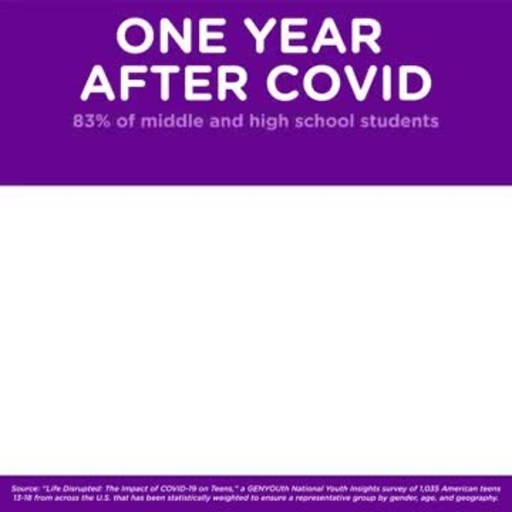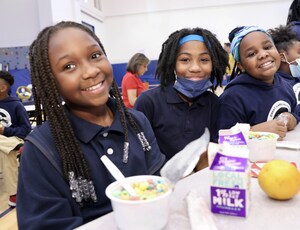As High School Graduations Commence And The School Year Comes To An End, Stressed Students Fear For Their Futures
New GENYOUth National Youth Insights Survey Reveals that the Pandemic has Impacted the Academic Readiness of 3 out of 4 U.S. Teens
NEW YORK, May 18, 2021 /PRNewswire/ -- GENYOUth, a national nonprofit organization dedicated to creating healthier school communities, released today the results of a new national survey of American teens examining their pandemic-driven state of mind as the high school graduation season gets underway and the 2020-2021 school year comes to an end.
The study, "The Impact of COVID-19 on Teens, One Year Later," paints a worrisome picture of a highly stressed generation ill-prepared on many fronts for the return to life as normal following over a year of school closures and learning disruptions. This stands in stark contrast to the optimism, excitement and sense of possibility teens would typically feel at this time of year.
Three in 10 students say the pandemic has had a "huge" impact on their academic readiness for next year, a number which increases substantially to 73 percent when "some" impact is included. And when asked what most concerns them one year into the pandemic, almost one in four high school seniors fear losing academic scholarship opportunities, 21 percent say gaining admission to a good college or vocational school, and 22 percent cite getting the kind of job they want.
"That students are feeling stressed after a year of pandemic learning is not a surprise, but our GENYOUth survey uncovers some very concerning trends. One is the extent to which fear is permeating all areas of teens' lives – academic, financial, social – indicating a mental and emotional health crisis we are not equipped to handle. Another is a significant gap in preparedness as those who are about to graduate advance to higher levels of schooling or the workplace, which colleges and employers both need to prepare for," said Alexis Glick, CEO of GENYOUth. "This study is a cry for help from our young people that will require us to stop, listen and work together to give them the support they need to ensure a healthier sense of well-being now and in the future."
Underscoring the level of worry and distress students are feeling, a Vermont high school educator who reviewed the survey results said, "Our high school kids are really struggling. They're falling apart. They'll walk into my office, tears running down their faces. It's very clear they are not ready [for the next school year]."
"The Impact of COVID-19 on Teens, One Year Later" follows a previous GENYOUth national teen survey conducted in May 2020 that documented the immediate disappointments of a crisis that at the time had not yet revealed its full horror and longevity. The new study identifies several areas of long-term concern and impact on youth well-being due to the pandemic.
Social and Emotional Well-being
- Although 83 percent of young people say they are overall coping generally well, 50 percent report their social well-being and 47 percent believe their emotional well-being are less than good. Ironically, during a year in which teens have been stuck at home and school sports have been largely sidelined, 74 percent of teens say their physical well-being is good.
- The reasons for teen distress are many. Due to the pandemic, over half (56 percent) report that they have little or no control over the lives. Over four in 10 (41 percent) feel isolated from other people, 31 percent have trouble concentrating, 29 percent are moody and emotional, and 21 percent have trouble sleeping.
Life and Death Fears
- Teens are acutely aware of the losses they are experiencing during the pandemic. In one of the survey's most jarring findings, 45 percent of high schoolers are most worried about people they know and love getting sick and dying (a number which rises to 52 percent of Black and Hispanic teens.)
- More than half of high school teens (53 percent) are most concerned about losing the happiest and most exciting years of their lives to the pandemic.
School Safety Concerns
- Students continue to have concerns about in-person learning. As of March 2020, 47 percent of teens surveyed attended at least some in-person classes, with lower numbers for Black (36 percent) and Hispanic (34 percent) students.
- Of students who were attending school in person, only 42 percent felt fully safe from COVID-19. Sending kids into an environment where they, and perhaps their teachers, do not feel safe is simply trading one set of learning challenges for another.
Financial Hardship and Learning Challenges
- Almost one-quarter of kids are worried about long-term family financial hardship, which increases to 3 in 10 for Black teens and teens from households making $50,000 or less per year. In a related finding, 58 percent report a steady or growing need for meals supplied by or through schools.
- Over half (53 percent) say they are not learning or keeping up with their classes as well as they were pre-pandemic. Primary obstacles cited by these students include increased difficulty absorbing information when not in the classroom (68 percent), a lack of hands-on learning opportunities (60 percent), unreasonable expectations of what they can do on their own (48 percent), challenges in getting individualized help (48 percent), and a high level of distractions when learning at home (45 percent).
Although the survey results are worrying and require an immediate response, just having their voices recognized and listened to has been important for teens. As Virginia high school student Brody explained, "This is one of first instances in which I was able to feel like I wasn't alone. The survey has validated my stressors surrounding COVID-19, allowed my opinion to be heard, and given me the opportunity to relate to and connect with other students. Knowing this is all being brought to light has improved my confidence in what the future holds."
Taking Action to Help Teens
The research points to six areas where programmatic school-based interventions, engagement by non-profits and the business sector, and government support will be necessary to address the impact of the pandemic on our young people.
- Continued financial assistance and food support for the 25-30% of young people whose families are facing long-term financial hardship
- Mental health support for students as they return to the school setting with compromised emotional, social, and intellectual well-being. This includes mental health support for teachers, many of whom have experienced their own traumas and hardships, and therefore may not be at their best or strongest just when their students will be needing them the most.
- Tutoring and catch-up programs to help students who have fallen behind and require extra individual help to be fully prepared for next year and beyond.
- Coaching and catch-up programs to help student athletes who may have missed two seasons of their sport and as a result may be out of shape with rusty skills.
- Safety measures and the necessary reassurances to make returning students and teachers feel fully safe in the classroom, in the hallways, in the school common areas and on the trip to and from school. But at the same time, these measures cannot impoverish the most important social and interpersonal aspects of in-person schooling.
- Remote learning infrastructure development and enhancement both to support any continuation of remote learning through the end of this pandemic and to maintain students' academic performance and readiness. This includes addressing the longstanding digital divide in education to ensure that laptops, broadband internet service and wireless hotspots are accessible and affordable for all households.
To read the full report, "The Impact of COVID-19 on Teens, One Year Later," visit www.genyouthnow.org
About GENYOUth
GENYOUth is a 501c3 nonprofit organization that creates healthier school communities. We convene a network of private and public partners, including Fortune 100 companies and foundations, to raise funds for youth wellness initiatives that give youth the inspiration, motivation, and programs to be healthy high-achieving students. GENYOUth's flagship program, Fuel Up to Play 60, enrolls over 73,000 U.S. schools, reaching over 38 million students. Our school nutrition grants increase access to healthy school meals among food insecure students. NFL FLAG-In-School is GENYOUth's fastest growing program with over 20,000+ school communities reaching over 11 million students while AdVenture Capital brings out the entrepreneurial spirit and creativity of students with the support of corporate mentors to solve real world problems.
Methodology for "Life Disrupted: The Impact of COVID-19 on Teens"
Online survey conducted February 11 to 24, 2021, with a sample of 1,035 middle, junior and senior high school students ages 13-18 from across the U.S. Results were statistically weighted to ensure a representative group by gender, age, and geography. Two focus groups with educators (conducted by video conference) were held to help interpret survey findings and report content.
SOURCE GENYOUth

Related Links
WANT YOUR COMPANY'S NEWS FEATURED ON PRNEWSWIRE.COM?
Newsrooms &
Influencers
Digital Media
Outlets
Journalists
Opted In







Share this article